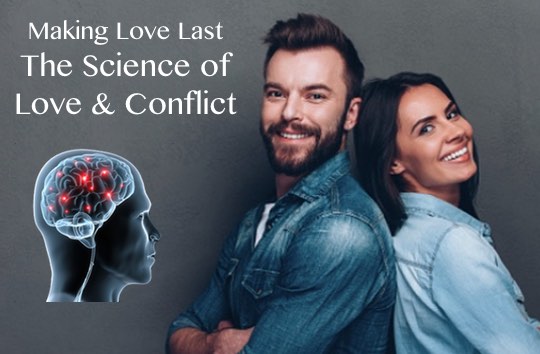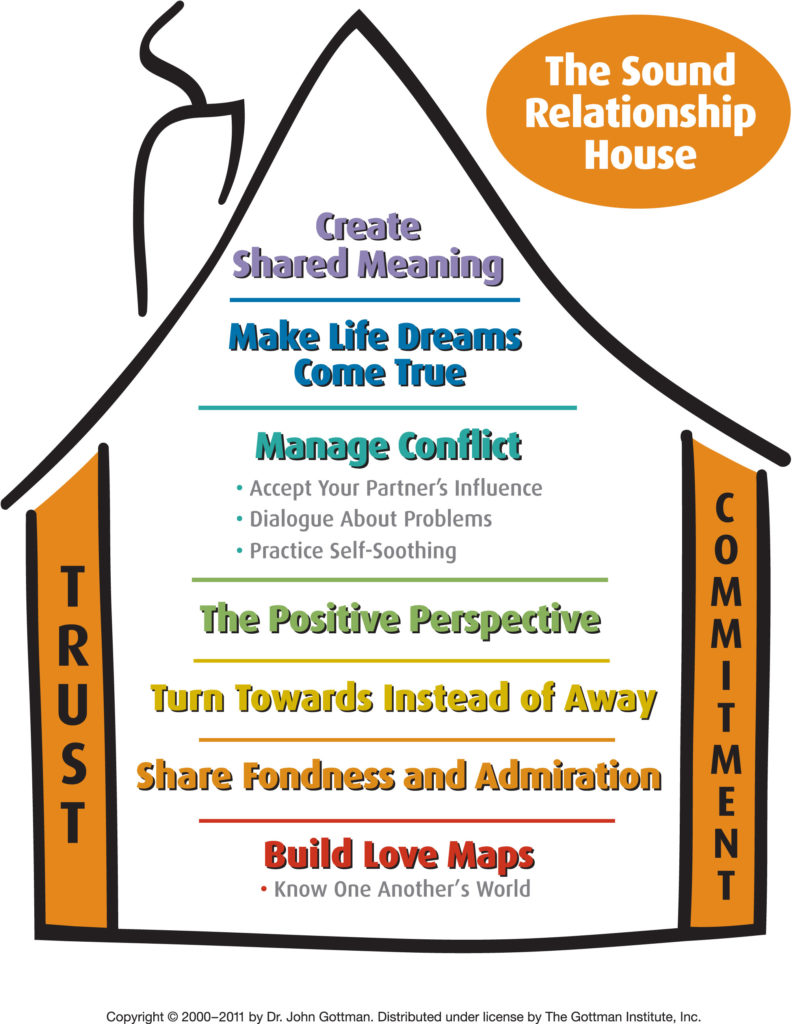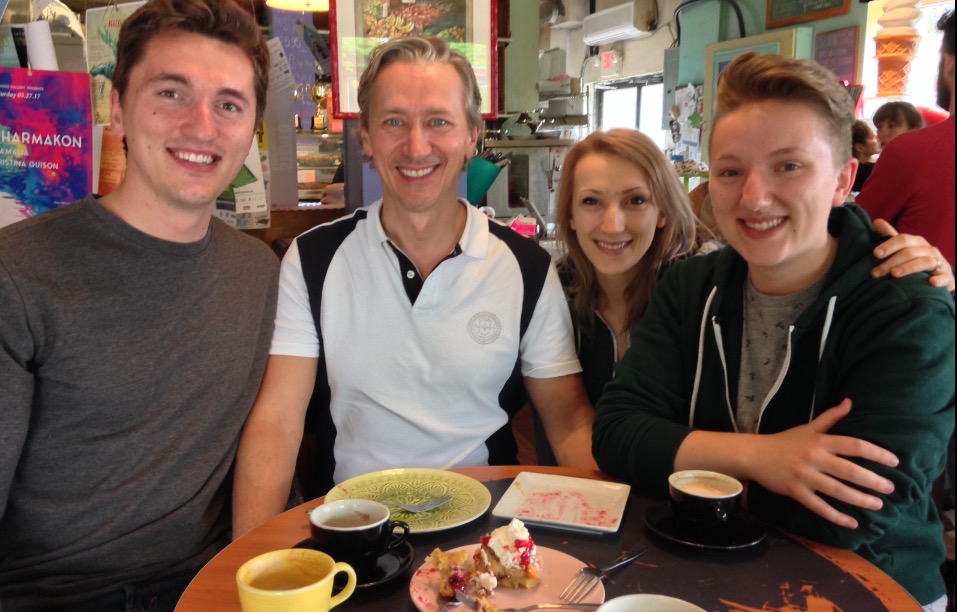– Marriage Counselling & Gottman Therapy, Calgary –
The Science of Love and Conflict

How a Directive Counselling Approach Helps Couples Thrive
– Written by Michael Haggstrom, Doctor in Counselling, Calgary –
What I found in working with couples over the past 25 years is that poorly managed conflict is the most common reason couples get into trouble. Almost everything stems from that, including their ability to maintain intimacy and connection over the long-term.
As such, I was curious in Dr. John Gottman’s methods. What I discovered first hand is that these methods indeed help save marriages.
Managing Conflict
In Gottman’s best-seller, The Seven Principles for Making Marriage Work, we learn the characteristics of successful relationships as outlined in “The Sound Relationship House”.
The two key pillars are, of course, Trust and Commitment. At the centre is the need to Manage Conflict by learning how to:
➤ Accept Your Partner’s Influence
➤ Listen & Dialogue About Problems
➤ Understand & Control Physiological Flooding
Dr. John Gottman and his research team studied over 3,000 couples for a period of forty years and discovered keys to creating healthy relationships that last. During conflict each person’s stress levels were monitored. Heart rates, blood pressure, sweat flow and even immune functions were measured and entered into a data bank, then analyzed.
Flooding – Diffuse Physiological Arousal DPA
One of their findings is what is termed as “Flooding” or “DPA” (Diffuse Physiological Arousal). It was discovered that as a person’s stress level increases, their cognitive and social brain function actually decrease; this in turn seriously inhibits a person’s ability to listen attentively and be present with their partner especially during conflict.
 At the beginning of therapy, discussions can get messy. Tempers rise as each partner tries to be right and prove the other wrong, “Why can’t you listen to me?!”
At the beginning of therapy, discussions can get messy. Tempers rise as each partner tries to be right and prove the other wrong, “Why can’t you listen to me?!”
There’s nothing wrong with passion. In fact, relationships would be boring without the full spectrum of emotion being experienced, including anger. However, when such emotion is too heightened, we run the risk of heading into the danger zone where we completely tune out our partner.
We have all been there. It’s a part of being human. Our mind believes something so strongly and has trouble letting in another person’s opinion or influence. This is especially true when we feel unjustly criticized or angry.
Flooding (DPA) Affects Listening
A heightened DPA will make couples argue more or avoid conflict altogether. The Fight-Flight response takes over. The body goes into over-activation and the body is on high self-defence alert.
In DPA, blood flow to the gut and kidneys is restricted, the heart rate elevates and adrenaline floods the nervous system. The mind can no longer be curious about what our partner has to say, as it is now incapable of listening due to the physiological over-activation.
As a clinical therapist, I have seen in counselling sessions that if a couple starts to experience high levels of stress, the effectiveness of that session will decrease as they enter into aggressive or passive mode, ceasing to be present with one another. Most people are not even aware that they are in heightened DPA mode.
Direct Counselling Approach – “No B-S”
Effective therapists help clients manage their ability to be present with one another. Only when this is managed can we then move toward resolving the issues at hand. I have heard far too often from clients how their past therapy experiences failed, because their therapist was too passive and just let them complain session after session, without ever really intervening to actively assist them in their struggles.
Over the years, I have developed a direct approach, or as I refer to it with clients, a “No-BS Approach”, while also being an ally to each partner in resolving their issues. I have found that honest, authentic communication assists clients more than letting them flounder in their struggles.
Nonjudgemental Approach
 I also do not look at taking sides. I’ve come to see that most relationship issues are not about who’s right and who’s wrong. If we expect to never have arguments or that having them is a sign that the relationship won’t work, then we are not looking at the facts.
I also do not look at taking sides. I’ve come to see that most relationship issues are not about who’s right and who’s wrong. If we expect to never have arguments or that having them is a sign that the relationship won’t work, then we are not looking at the facts.
In his studies, Dr. John Gottman discovered that on average 69% of recurring conflict problems in marriage will not get easily resolved and that this will be the same in any relationship. So, accepting conflict and learning the skills to work with it as it arises, is vital for any relationship to succeed.
Processing Conflict to Create Win-Win Authentically
Therefore, what’s important is to develop processes that help us during disagreements, without us going down the road of taking things personally. This is why therapy can be so important. As a therapist, I love helping clients learn how to get their needs met without attacking their partner, along with helping them tear down the walls that create defensiveness.
It’s empowering for couples to discover they can be in a conflictual situation of disagreement without getting hijacked by anger or avoidance. Couples can still share the passion and vitality of some of the messiness that goes with being in relationship, but without hurting one another over and over.
Couples Want Understanding
When we learn to disagree and still be relational, we enter into a new space of power with the ability to come to an agreeable outcome for both, where win-win is possible.
One of the keys to resolving conflict is understanding, where we are heard and listened to. When we really understand our partner and why things are important to them, it makes compromise so much easier.
Dr. John Gottman has a fantastic tool that follows a 5 Step Protocol for helping couple work through a fight or ongoing conflict issue. I have used it often with excellent success. In a 90 minute session, clients have discovered more about themselves with this tool, than having fought about the very same issue for years.
Coaching Clients to Communicate Better
It is my job to help couples communicate well. I will never understand therapists who don’t get couples to talk with one another in session about the issues that are troubling them. So often therapists act as umpires or judges individually with each partner, rather than coaching the couple together. The non-coaching approach is drastically inferior with a high failure rate.
I believe that as therapists, we are to instruct clients practically by means of actively equipping them with better tools. The Gottman Method is very good at adding to a therapist’s toolkit with effective methods to assist in improving joint interactions and communication.
In fact, many of Gottman’s interventions require therapists to get couples talking about troubling issues together and then guiding them through coaching processes that help to improve their ability to resolve conflicts on their own.
These coaching methods are effective and couples report having high levels of success when they practice the methods outside of the counselling office.
When conflict is better managed, this in turn helps us work at enhancing the relationship by moving toward relationship-building therapeutic interventions, such as building “Love Maps”, “Sharing Fondness or Affection” or “Creating Shared Meaning”.
In Conclusion – Making Love Last
As a clinical therapist, I seek to work hard and smart for my clients. A direct approach helps us get to the bottom of issues faster and a coaching approach equips clients with tools in resolving conflict effectively.
Staying in love shouldn’t be a mystery. When a couple has less conflict and more love, then those positive feelings will help give a couple staying power. Smart couples live their lives with intention. The key is to be proactive.
– Written by Michael Haggstrom, Doctor in Counselling, Calgary
Watch Video to Know More
Marriage Counselling & Gottman Therapy, Calgary
We help couples fix their relationship problems so they can thrive again.
Dr. Michael Haggstrom and Marcus Pankiw, Gottman Couples & Marriage Counselling, Calgary.
Call Us 403-220-1101 or Email.
We all want to have close relationships that matter – ones where we can be real, have fun and find meaning. But, how do we create those relationships?
We will argue. Differences of opinion and preference are inevitable. To create great relationships we need to engage in ongoing dialogue to…
John and Alexia are going apart. They are avoiding intimacy, unsure of how to rekindle the passion they once shared. Instead of talking about it, they…
Sources:
Dr. John Gottman. (1999). The Seven Principles for Making Marriage Work. New York: Three Rivers Press.
Marital conflict and endocrine function: Are men really more physiologically affected than women? Kiecolt-Glaser, Janice K. Journal of Consulting and Clinical Psychology, Vol 64(2), Apr 1996, 324-332
Paul D. Tyson. Physiological arousal, reactive aggression, and the induction of an incompatible relaxation response. Volume 3, Issue 2, Summer 1998, Pages 143–158. Aggression and Violent Behaviour.














Leave A Comment